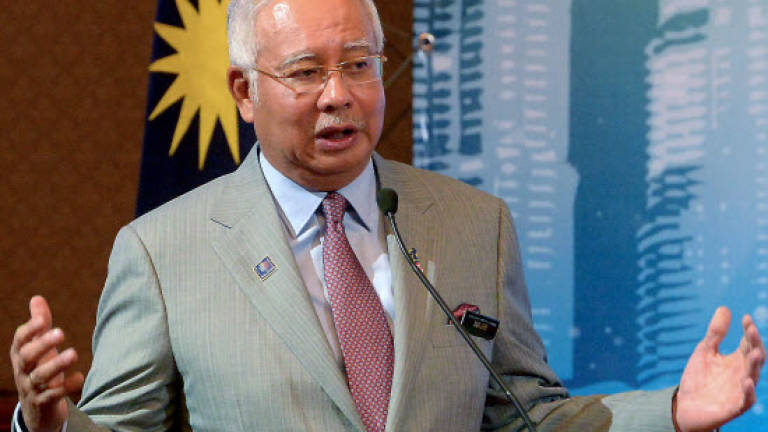PM: More direct involvement of society in Asean activities

KUALA LUMPUR: Malaysia, to be the Asean chair in 2015, will strive to ensure that the creation of a 'people-centred Asean' in 2015 will see more direct involvement of all sectors of society in Asean's activities, said Prime Minister Datuk Seri Najib Abdul Razak (pix).
He said the theme chosen would be a sharper instrument for the realisation of the peoples' dreams for more effective and responsive governance; better standards of living; strengthened environmental protection; further empowerment of women and greater opportunity for all.
"No longer will Asean be the domain of the elites and specialists alone. An Asean Community which is people-centred will truly be 'One Asean for All," he said in his keynote address at the National Colloquium on Malaysia's Chairmanship of Asean 2015, here, today.
Najib noted that demand for democratisation and more effective governance was not the only impulse for goals, as it also involved political and economic interests.
He said that involving all sectors of society in the formulation and implementation of Asean agreements would make it more reflective of their needs.
"I believe that only the more direct involvement of the peoples of Asean will truly advance regional integration.
"We want to build an Asean which reflects the dreams of our peoples, is at ease with itself, and ready to contribute positively to global affairs," he said.
To be able to do so, Najib said, Asean institutions, including the Asean Secretariat, must be properly funded and resourced. Presently, he said, each member state contributed US$1.7 million for the running of the secretariat.
However, in recognising that financial contributions were particularly sensitive, Najib suggested that instead of all members contributing equally, they could all agree on a minimum level of common contribution.
Countries which wanted to voluntarily contribute more could do so, he said, adding that for the sake of funding predictability, they could also be encouraged to make additional contributions on a three to five-year time frame rather than on an annual basis.
"Funding and resourcing Asean will be one of Malaysia's key focus areas. Malaysia will continue to work with other member states on this important issue," he said, adding that the creation of a strong, robust and efficient Asean institution would also be Malaysia's priority.
The prime minister also outlined four challenges that Asean would likely face in the post-2015 period. One of the challenges, he said, was to address and resolve the tension between the 'Asean Way' and the rules-based approach.
The 'Asean-Way' emphasised personal relations and behind-the-scenes agreements while the rules-based approach relied on the objective application of regulations, norms and dispute-settlement mechanisms, he added.
The second challenge was to express Asean's goals in more concrete and operational terms, and they must be specific, measurable, attainable, relevant and time-bound, he said.
Najib also suggested that Asean's three community pillars of political and security co-operation, economic integration and socio-cultural co-operation could be expanded to include another pillar to deal with environment and governance issues.
"Only then, in my view, can we have a focused discussion on critical issues such as climate change and the haze problem," he said.
Najib said other challenges were to make Asean's achievements and significance more widely known, as well as widen its scope of coverage as it progressed and matured.
The three-day colloquium is jointly organised by the Foreign Ministry, Institute of Diplomacy and Foreign Relations, Universiti Teknologi Mara and the Institute of Strategic and International Studies.
Some 200 people, among them academicians, researchers and diplomats, are attending the colloquium. – Bernama